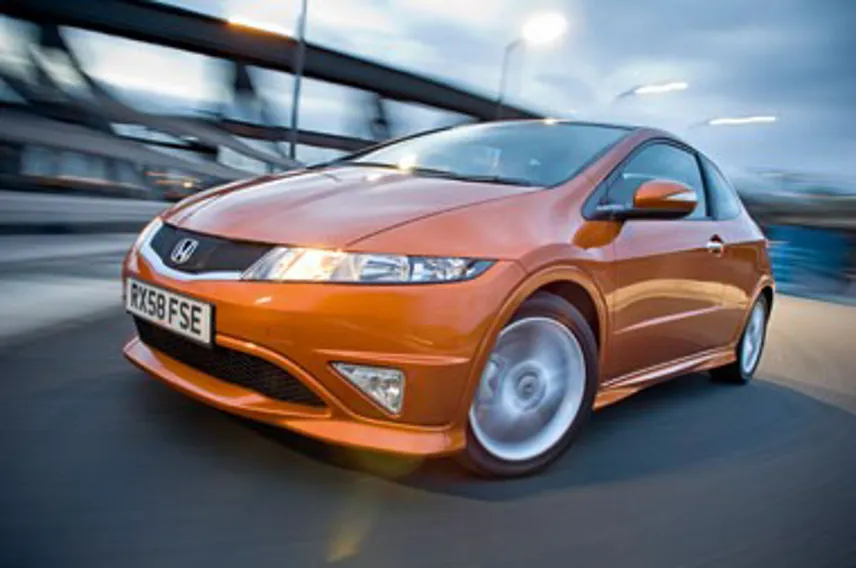Review
When you spend most of your life driving diesel cars with all that instant low-down punch, it comes as something of a shock to drive something as slow as the new petrol Honda Civic 1.4 i-VTEC.
I know that cheetah-like pace off the line isn’t the most pressing demand for a fleet manager, but this new Civic’s speed, or more precisely the lack thereof, really does become the over-riding impression after a few miles.
At first look, the Type S trim is pretty snazzy, with mesh grille, body skirts, sporty seats and metal-effect trim inside making it look and feel a much more expensive car than it is, if not making it go any faster.
The newest addition to the Civic line-up, the 1.4-litre i-VTEC – an entry-level, Euro V engine – replaces the former i-DSi unit, with improved CO2 emissions, fuel economy and more power, up to 100bhp and, tellingly, 94lb-ft of torque, which wouldn’t seem enough to knock the skin off a rice pudding.
However, these lowly figures mean that the 1.4 i-VTEC is actually pretty efficient – it will manage fuel economy of 47.9mpg (combined) and CO2 emissions of 135g/km, excellent for a petrol car of its class, and way ahead of anything that Ford, Vauxhall, Citroen et al can manage.
Accelerate from low down in the rev range and the digital speedo ticks off mph with little enthusiasm.
Then, above about 3,500rpm, it starts to zing and the acceleration curve goes from near flat to a bracing incline.
Thanks to Honda’s VTEC valve and fuelling trickery, there’s a real spark hidden in there.
A scan back through the figures of the competition reveals that the Honda is actually more powerful than any of the other cars, as well as being noticeably more efficient.
In short, hidden away at the bottom of the range, this is a nugget of nippyness, a pearl of parsimony.
But it still begs the question – why would fleets buy one?
Well, Honda is big into public sector fleets, where small petrol cars predominate, and it does some very good business with the Jazz (and the previous 1.4 Civic) to health authorities.
I can see how this new one would be an excellent car for that sector, offering more space, the still-adaptable luggage compartment, and all the while not costing the earth to run.
In fact, for any user-chooser driver who has a company car but doesn’t do many miles, wants to downsize and feels that the initial cost of a diesel and the extra you pay at the pumps doesn’t make it a worthwhile investment, this could be a good choice, especially as for the price it looks worth far more money than you’re paying.
Positives
- Type S looks
- Low emissions
- Performance can be found
Negatives
- Slow at low revs
- High front-end price
Rivals to consider
- Peugeot 308 1.4 VTi Urban
- Toyota Auris 1.3 Dual VVTi T2
- Volkswagen Golf 1.4 S
P11D price
Entry levels in their respective ranges, so don’t expect fireworks, but there could always be special offers or upgrades – for example, Peugeot has a Verve special edition.
The Civic is expensive at the front end, but the full story will reveal itself later.
Emissions and tax rates
The CO2 levels of the Auris and Civic offer a benefit of 2% over the VW, and in the Honda’s case go some way to offsetting its higher front-end price.
The Auris would cost a base rate tax payer about £400 a year, the Civic £60 more.
The Golf will cost £475 and the Peugeot £535.
SMR Cost
None of these cars run on expensive rubber, or have terrifyingly high hourly servicing rates, and as a result all are cheap to service, maintain and repair.
The French brands are getting their act together and compete, and in the case of the 308 beat, the trusty Japanese brands.
The Golf is the cheapest, though.
Fuel cost
The Honda (claimed economy of 47.9mpg combined) and Toyota (48.7) are more economical than the Golf (44.1) and Peugeot (43.5), but bear in mind that these differences have been extrapolated over 60,000 miles, and I wouldn’t wish trying to match these figures on anyone.
Depreciation cost
The Volkswagen is miles ahead in terms of retaining value, with CAP estimating it will be worth £5,225 (41% of cost new) after three years and 60,000 miles.
The Toyota will be worth £3,650 (29%), the Honda £4,625 (33%) and the Peugeot £3,375 (25%).
Verdict
So much about choosing these cars is to do with costs that it makes the decision a pretty straightforward one.
The new Golf is miles ahead of the competition (£1,000 cheaper than the second-placed Auris over 60,000 miles) thanks to the way its out-performs the others at resale time – more than £2,000 cheaper to run than the 308 is a mighty performance.
But I really liked the Civic. I like the style of it, I like the fact that you don’t feel that you are in a poor relation model and that it’s made in Britain, too.
So if this was purely my decision, I’d have the Honda.
But cold logical dictates that the Golf wins this test.
WINNER: Volkswagen Golf 1.4 S
















